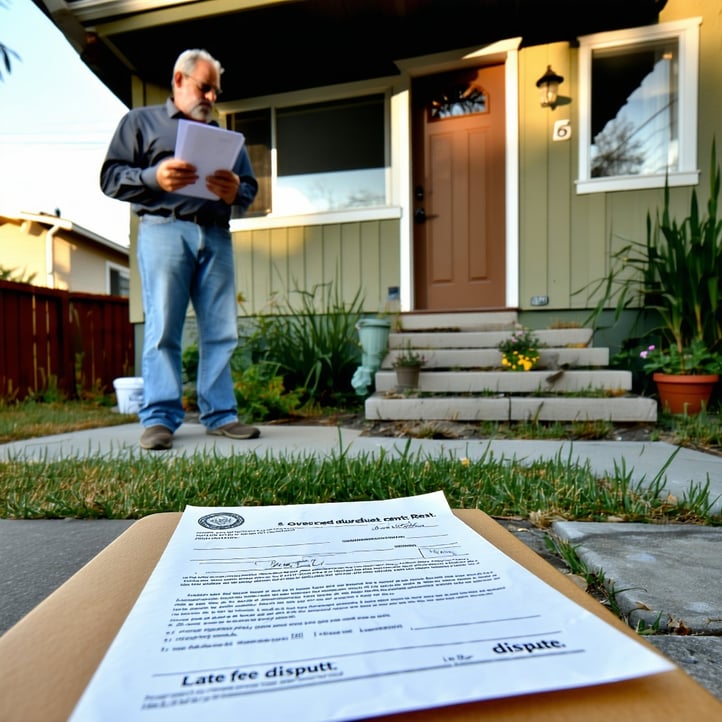Late fees seem simple enough. A tenant pays rent late, so they owe a little extra right? Not so fast. In California, it’s not that straightforward. Charging late fees can land a landlord in legal trouble if done incorrectly. Let’s look at a true scenario.
A landlord in San Marcos added a $100 late fee to a lease. The rent was $2,500 a month. No one questioned it until the tenant fell behind and challenged the fee in court. The court sided with the tenant. Why? Because the landlord never documented why $100 was a reasonable estimate of damages. He lost not just the late fee but the eviction case too.
If you’re a landlord in Carlsbad, Encinitas, San Marcos, or anywhere in North County San Diego, here’s what you need to know to stay compliant, avoid lawsuits, and still protect your business.
Why Late Fees Are Risky in California
California does not have a fixed dollar amount or percentage that landlords can charge for late fees. Instead, late fees are considered liquidated damages under Civil Code §1671. That means the landlord must prove two things:
- The actual damage caused by the late payment is impractical or extremely difficult to calculate.
- The fee is a reasonable estimate of the damage.
If you can’t prove both, the fee may be invalid even if it’s listed in the lease.
Legal Precedent: What the Courts Have Said
In the 2004 case Orozco v. Casimiro, a California court confirmed that late fees in residential leases can be enforceable but only if they meet the legal test. In that case, the court invalidated the $50 late fee because the landlord failed to prove it reflected actual administrative costs or the difficulty in calculating them.
In 2018, another case (Del Monte Properties v. Dolan) reinforced the same point: landlords must show that the fee was based on a reasonable estimate of loss and not designed to punish the tenant or generate extra profit.
So, you can’t just pick a number because “that’s what other landlords do.”
What Makes a Late Fee Valid?
If you want to include a late fee in your lease, follow these steps:
- Put It in the Lease
If the lease doesn’t mention a late fee, it’s not enforceable period. Don’t try to charge a fee after the fact or by verbal agreement.
- Include Proper Language
Your lease should clearly state:
- That the fee is intended to compensate for damages.
- That actual damages from late rent are difficult to calculate.
- That the fee is a reasonable estimate of the loss.
- Justify the Amount
You need a paper trail. Document how you came up with the fee. Did you calculate the cost of extra admin time, missed mortgage interest, or accounting delays? Keep those notes in your file. If the fee is challenged in court, this evidence is essential.
- Avoid Daily or Percentage-Based Fees
A one-time, fixed-dollar amount is harder to dispute. A daily fee can be seen as punitive because your costs don’t necessarily increase with each passing day. Similarly, a percentage of rent can be problematic because a higher rent doesn’t always mean higher admin costs.
- Get Legal Review
Before adding a late fee to your lease, ask a landlord-tenant attorney to review the clause. Lawsuits over late fees are increasing in California, and the penalties can be significant.
Collecting Late Fees: What You Can and Can’t Do
Even if your late fee clause is valid, collecting the fee is not always simple.
Can You Include It in a 3-Day Notice to Pay or Quit?
Technically, you can but it’s risky. Many tenant attorneys will challenge any 3-Day Notice that includes more than just rent. Courts may consider it defective if it demands more than rent, even if your lease calls the late fee “rent.”
The safer route: serve a 3-Day Notice to Perform Covenants or Quit for the late fee violation separately. You can serve it at the same time as the rent notice, but don’t combine them.
Can You Deduct It from the Security Deposit?
Maybe but be careful. California law lets landlords deduct for unpaid rent, cleaning, and damages. Late fees are not listed specifically, which means a tenant could challenge it. If you do deduct a late fee, be ready to show that the lease authorizes it and that you met all the liquidated damages requirements.
Can You Sue in Small Claims Court?
Yes. This may be the most reliable way to recover late fees. But again you’ll need documentation showing why the fee is valid.
Mistakes Landlords Make (and How to Avoid Them)
- Mistake #1: Charging a late fee without a written lease clause.
- Mistake #2: Picking a “nice round number” like $100 with no rationale.
- Mistake #3: Including late fees in a rent demand notice.
- Mistake #4: Not keeping evidence to justify the fee if challenged.
What Happens if Your Fee Is Too High?
Tenants may argue the entire late fee should be credited toward rent. That can derail an eviction case. Judges have ruled in favor of tenants when the fee appears excessive or was never documented properly.
Bottom Line
Late fees can be a useful tool for landlords but only if done right. A well-crafted clause protects your income and deters late payments. A poorly written one invites lawsuits.
At Raintree Property Management, we’ve screened and approved leases with enforceable, court-tested late fee language. We don’t leave it up to chance. Our clients avoid court battles, stay compliant, and get paid on time.
Want to Avoid the Risk?
Click here to get a free rental analysis. We’ll walk you through what fees are enforceable and help you avoid legal pitfalls that cost other landlords thousands.




